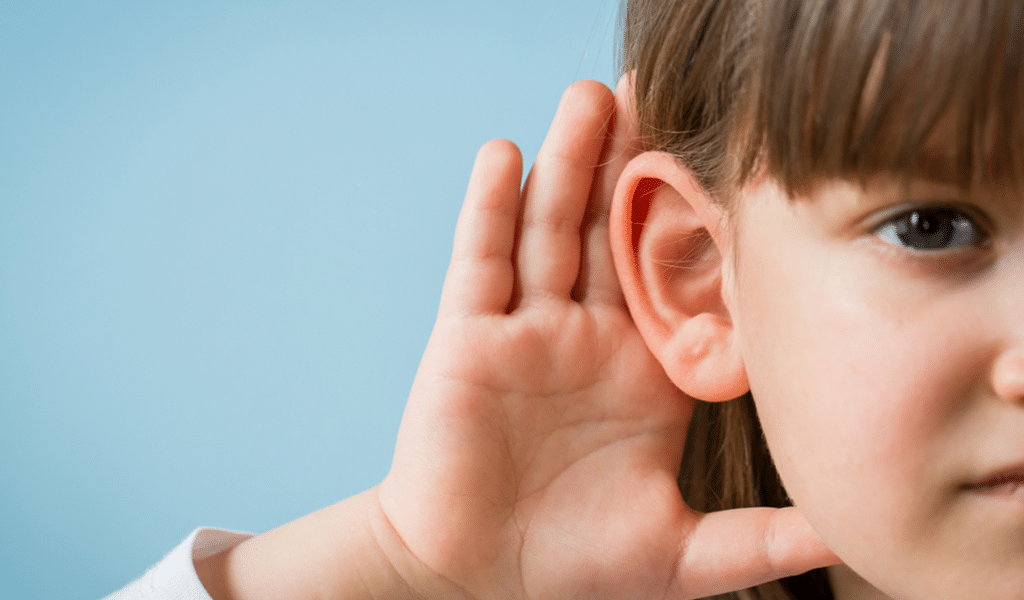- Rhinoplasty
- Sinusitis Treatment
- Revision Rhinoplasty
- Bone Curvature (Septum Deviation)
- Septum Perforation Treatment
- Nasal Flesh (Concha Hypertrophy)
- Nasal Congestion
- Hearing Loss
- Cochlear Implant
- Hearing Loss in Children
- Tympanoplasty
- Vertigo
- Tinnitus
- Middle Ear Microsurgery
- Otosclerosis
- Ear Tube
- Larynx Cancer
- Trachea Diseases, Stenosis
- Oral Cancer
- Cancer of the Pharynx
- Salivary Gland Diseases, Tumours
- Thyroid Surgery
- Neck Masses

Contents
ToggleHearing Problems and Diagnostic Methods in Children
Although hearing loss is generally thought to occur in advanced ages, it is actually a condition that can be seen at any age. Hearing problems can occur both before and after birth, and these problems can be detected by certain methods. If hearing loss is thought to be present in children living in Samsun, it is important to consult an otolaryngologist.
Hearing loss in children means a lack of hearing or a complete loss of hearing, as in adults. However, hearing problems in babies who are not yet capable of verbal communication can be difficult for parents to recognise. Newborn babies can be more difficult to recognise hearing problems because they are not capable of reacting. However, babies usually become sensitive to loud sounds by 3 months. This sensitivity to loud noises manifests itself in the way babies react to sound. This manifests itself in behaviour such as babies jumping, crying or waking up in response to sound. As the baby grows older, their reactions to loud noises also change. Instead of fear and crying, they begin to show behaviours such as looking and focusing on the source of the sound. Such reactions are an indication of babies' sensitivity to sounds. If babies have hearing problems or signs of hearing deficiency, hearing tests can be performed. Such tests are also performed on babies who do not show any obvious signs and are important for early diagnosis of hearing problems. Early diagnosis can positively affect the treatment process. In our country, the newborn hearing screening programme (YEDIT) provides routine screening tests for early diagnosis of hearing problems in infants after birth. Babies who do not pass this test are regularly checked to determine whether they have a hearing problem. Families who regularly participate in these tests and check-ups help to identify hearing problems early and provide the necessary rehabilitation.
Causes of Hearing Loss in Children
Hearing problems in children can be genetic or the result of many non-genetic factors. Factors that cause hearing loss in children may include:
- Premature birth (prematurity)
- Passing febrile diseases
- Meningitis
- Head trauma
- Jaundice due to blood incompatibility
- Febrile illnesses of the expectant mother during pregnancy
- Abnormal structures in the face and head region
- Use of ototoxic drugs
Symptoms of Hearing Problems in Children
Hearing problems in children can cause different symptoms than hearing problems in adults. Symptoms of hearing problems in babies can be the following:
- The baby does not react to loud noises
- Does not react to loud noises, does not cry or jump
- As the baby grows, if the baby looks at or focuses on the source of the sound instead of reacting normally to sounds
Hearing problems in children can manifest themselves in different ways in older children. These symptoms may include:
- Failure to fulfil the instructions given
- Difficulty in communicating and lack of development of speaking skills
- Difficulty understanding people who are trying to communicate with them and feeling tired because of this
- Trying to read lips
Diagnosis of Hearing Problems in Children
Hearing problems in children are diagnosed by an otolaryngologist. Hearing problems can be detected in newborn babies with hearing and screening tests. However, in some cases, these tests may not be sufficient. Especially in cases of prematurity, inner ear tests called otoacoustic emission and ABR (Auditory Brainstem Response) can be performed.
- Otoacoustic Emission: Sound is sent to the ear with a loudspeaker and the sounds inside the snail are recorded with a microphone. This is how the function of the snail is analysed.
- Tympanometer: Light air conduction is used to assess the function of the eardrum and middle ear.
- ABR (Auditory Brainstem Response): Auditory waves are recorded directly from the brainstem.
Treatment Methods of Hearing Problems in Children
There are various treatment options for hearing problems in children, and these options may vary depending on the cause and severity of the hearing loss. Treatment methods for hearing problems may include:
- Medication: Hearing problems in some children may be caused by dirt accumulated in the outer ear or fluid accumulated in the middle ear. Treatment of such conditions can be done with medication. Medications are determined according to the type and severity of the condition.
- Hearing Aids: Hearing aids can be used to treat hearing problems in children and babies.
- Cochlear Implant: In children with extremely severe hearing loss, a cochlear implant can be placed through a surgical procedure.
